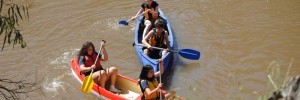Topics

A list of general creative curriculum topic ideas which teachers can use in their classrooms to inspire your planning.
- What makes up the natural environment?
- Overview (water, land, plants, animals, air)
- Study of local plants
- Habitat assessment
- Study of local animals
- Study of local birds
- Study of aquatic animals, macroinvertebrates, native fish
- Study of frogs
- Study of bugs
- Study of water quality
- Study of wetlands
- Study of rivers
- Study of River Red gum forests
- Study of soil
- Bush tucker
- How natural environments work.
- Basic ecology: food chains and food webs. Terrestrial and aquatic ecosystems
- Natural disasters - flood, fire, storms
- Aboriginal peoples understanding of the natural environment
- Living laboratory, conducting scientific research (e.g. different revegetation techniques.)
- How humans change environments?
- Positive and negative changes
- Introduced species - weeds and/or feral animals
- Threatened species, eg Squirrel glider
- Water quality (river, storm water drains and agric drains) eg water quality tests (Physical, chemical, biological)
- Impact of changing river flow regimes
- Sustainable environments: how can we enjoy the environment and look after it.
- Code of behaviour, rules, regulations.
- Data collection and research
- Management Plans
- Shepparton Regional Park and Lower Goulburn National Park
- Aboriginal peoples relationship with the land
- Habitat restoration projects – revegetation, weed mapping and removal, litter removal, building and placement of nesting boxes, photographic record of habitat change (impact of floods, wind storms, fire)
- Fish ways
- How humans use the river and forest environment
- Recreation: Canoe, bike and walking trips along the river, Cross country run through the area, Fishing, Picnic/BBQ on the river, Orienteering
- Agricultural, Manufacturing and Urban water supply
- Aboriginal use of the natural environment and cultural study
- History of our area
- Aboriginal history
- European history